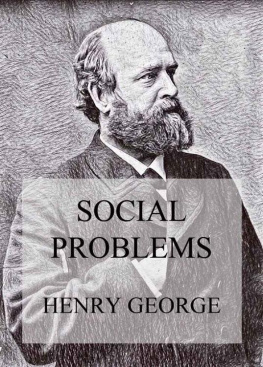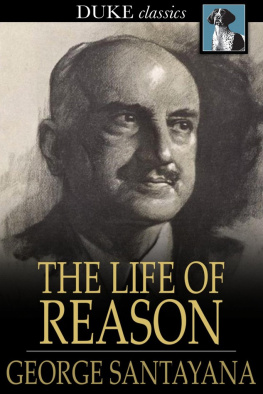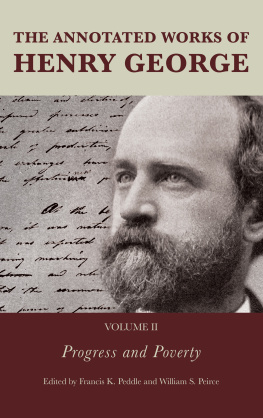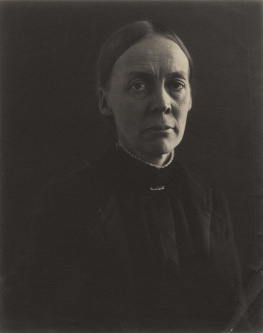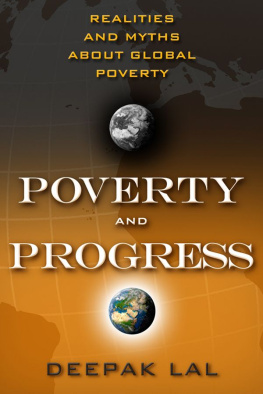This Memorial Edition of the Writings of
Henry George is limited to one thousand
numbered copies, of which this is
No. 4
MEMORIAL EDITION
OF THE WRITINGS
OF HENRY GEORGE
Vol. I.
Make for thyself a definition or description of the thing which is presented to thee, so as to see distinctly what kind of a thing it is, in its substance, in its nudity, in its complete entirety, and tell thyself its proper name, and the names of the things of which it has been compounded, and into which it will be resolved. For nothing is so productive of elevation of mind as to be able to examine methodically and truly every object which is presented to thee in life, and always to look at things so as to see at the same time what kind of universe this is, and what kind of use everything performs in it, and what value everything has with reference to the whole, and what with reference to man, who is a citizen of the highest city, of which all other cities are like families; what each thing is, and of what it is composed, and how long it is the nature of this thing to endure.Marcus Aurelius Antoninus.
Henry George when writing Progress and Poverty San Francisco, 1879
Title Page
THE WRITINGS OF
HENRY GEORGE
PROGRESS AND POVERTY
AN INQUIRY INTO THE CAUSE OF INDUSTRIAL
DEPRESSIONS AND OF INCREASE
OF WANT WITH INCREASE OF WEALTH
THE REMEDY
I
NEW YORK: DOUBLEDAY
AND MCCLURE COMPANY
1898
Copyright, 1891, by
Henry George
The De Vinne Press.
TO THOSE WHO,
SEEING THE VICE AND MISERY THAT SPRING FROM
THE UNEQUAL DISTRIBUTION
OF WEALTH AND PRIVILEGE,
FEEL THE POSSIBILITY OF A HIGHER SOCIAL STATE
AND WOULD STRIVE FOR ITS ATTAINMENT
San Francisco , March, 1879.
There must be refuge! Men
Perished in winter winds till one smote fire
From flint stones coldly hiding what they held,
The red spark treasured from the kindling sun;
They gorged on flesh like wolves, till one sowed corn,
Which grew a weed, yet makes the life of man;
They mowed and babbled till some tongue struck speech,
And patient fingers framed the lettered sound.
What good gift have my brothers, but it came
From search and strife and loving sacrifice?
Edwin Arnold.
Never yet
Share of Truth was vainly set
In the worlds wide fallow;
After hands shall sow the seed,
After hands, from hill and mead,
Reap the harvests yellow.
Whittier.
PREFACE TO FOURTH EDITION.
The views herein set forth were in the main briefly stated in a pamphlet entitled Our Land and Land Policy, published in San Francisco in 1871. I then intended, as soon as I could, to present them more fully, but the opportunity did not for a long time occur. In the meanwhile I became even more firmly convinced of their truth, and saw more completely and clearly their relations; and I also saw how many false ideas and erroneous habits of thought stood in the way of their recognition, and how necessary it was to go over the whole ground.
This I have here tried to do, as thoroughly as space would permit. It has been necessary for me to clear away before I could build up, and to write at once for those who have made no previous study of such subjects, and for those who are familiar with economic reasonings; and, so great is the scope of the argument that it has been impossible to treat with the fullness they deserve many of the questions raised. What I have most endeavored to do is to establish general principles, trusting to my readers to carry further their applications where this is needed.
In certain respects this book will be best appreciated by those who have some knowledge of economic literature; but no previous reading is necessary to the understanding of the argument or the passing of judgment upon its conclusions. The facts upon which I have relied are not facts which can be verified only by a search through libraries. They are facts of common observation and common knowledge, which every reader can verify for himself, just as he can decide whether the reasoning from them is or is not valid.
Beginning with a brief statement of facts which suggest this inquiry, I proceed to examine the explanation currently given in the name of political economy of the reason why, in spite of the increase of productive power, wages tend to the minimum of a bare living. This examination shows that the current doctrine of wages is founded upon a misconception; that, in truth, wages are produced by the labor for which they are paid, and should, other things being equal, increase with the number of laborers. Here the inquiry meets a doctrine which is the foundation and center of most important economic theories, and which has powerfully influenced thought in all directionsthe Malthusian doctrine, that population tends to increase faster than subsistence. Examination, however, shows that this doctrine has no real support either in fact or in analogy, and that when brought to a decisive test it is utterly disproved.
Thus far the results of the inquiry, though extremely important, are mainly negative. They show that current theories do not satisfactorily explain the connection of poverty with material progress, but throw no light upon the problem itself, beyond showing that its solution must be sought in the laws which govern the distribution of wealth. It therefore becomes necessary to carry the inquiry into this field. A preliminary review shows that the three laws of distribution must necessarily correlate with each other, which as laid down by the current political economy they fail to do, and an examination of the terminology in use reveals the confusion of thought by which this discrepancy has been slurred over. Proceeding then to work out the laws of distribution, I first take up the law of rent. This, it is readily seen, is correctly apprehended by the current political economy. But it is also seen that the full scope of this law has not been appreciated, and that it involves as corollaries the laws of wages and interestthe cause which determines what part of the produce shall go to the land owner necessarily determining what part shall be left for labor and capital. Without resting here, I proceed to an independent deduction of the laws of interest and wages. I have stopped to determine the real cause and justification of interest, and to point out a source of much misconceptionthe confounding of what are really the profits of monopoly with the legitimate earnings of capital. Then returning to the main inquiry, investigation shows that interest must rise and fall with wages, and depends ultimately upon the same thing as rentthe margin of cultivation or point in production where rent begins. A similar but independent investigation of the law of wages yields similar harmonious results. Thus the three laws of distribution are brought into mutual support and harmony, and the fact that with material progress rent everywhere advances is seen to explain the fact that wages and interest do not advance.
What causes this advance of rent is the next question that arises, and it necessitates an examination of the effect of material progress upon the distribution of wealth. Separating the factors of material progress into increase of population and improvements in the arts, it is first seen that increase in population tends constantly, not merely by reducing the margin of cultivation, but by localizing the economies and powers which come with increased population, to increase the proportion of the aggregate produce which is taken in rent, and to reduce that which goes as wages and interest. Then eliminating increase of population, it is seen that improvement in the methods and powers of production tends in the same direction, and, land being held as private property, would produce in a stationary population all the effects attributed by the Malthusian doctrine to pressure of population. And then a consideration of the effects of the continuous increase in land values which thus spring from material progress reveals in the speculative advance inevitably begotten when land is private property a derivative but most powerful cause of the increase of rent and the crowding down of wages. Deduction shows that this cause must necessarily produce periodical industrial depressions, and induction proves the conclusion; while from the analysis which has thus been made it is seen that the necessary result of material progress, land being private property, is, no matter what the increase in population, to force laborers to wages which give but a bare living.



